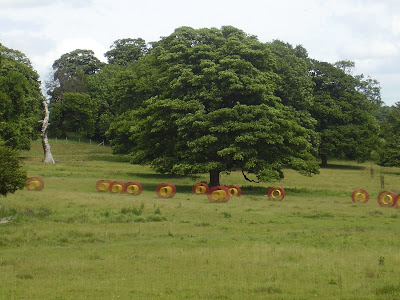
We are going to have to relate quite differently to our neighbouring town centre parish. The appointment of a new
Priest-in-Charge and
Area Dean was announced yesterday when I was covering the main service at what is now Grimsby
Minister, and the people there were told he should be with us in September. We look forward to welcoming him.
Three of the phrases in that opening paragraph are significant, and appear to be part of a cumulative plan by the Area Bishop being put in place piece by piece with different levels of consultation and collaborative planning.
Designating Grimsby Parish Church as a
Minster built on the work of the previous incumbent’s commitment to the civic role and world facing ministry of the church and his work as a valued member of the local authority’s Local Strategic Partnership. Momentum hasn’t been lost during the vacancy and taking forward things like a new shop and major art displays have been impressive. There are quite different models of Minister out there from those where a centrally based ‘college of priests’ sends out resources to a wider area to those where central specialist provision complements the work of neighbouring parishes, and it will be interesting to learn what the new incumbent thinks the role of this particular Minister should be. Those involved in the Minster’s educational outreach have written to at least some of the Primary Schools in this parish not only advertising things we could not offer but also things which we do, which was an unfortunate small cloud on the horizon.
We are told that suspending presentation of a Rector to the whole Great Grimsby Team and appointing a
Priest-in-Charge instead is to leave open the possibility that a review of the use and deployment of ministry in the parish and how this affects ministry in the town might result in proposals for pastoral reorganisation. The legal process of consulting about the suspension hadn’t been completed when the advert for the post as Priest-in-Charge appeared, which I assume is a little unusual. Sensitive readers will understand that I’ve been expressing more anxiety about being properly involved in developing and being part of the review process.
The new post of
Area Dean for the whole unitary authority of North East Lincolnshire parallels an appointment just made at the largest church in Scunthorpe for the neighbouring unitary authority of North Lincolnshire. The job description (which we were sent for comment just as it was going out to applicants) highlights two roles. That of representing the church in the civic, commercial and third sector life of North East Lincolnshire sits very well with the potential role of the Minister, although it will need handling sensitively alongside the job description of the Industrial Missioner (although not as much as in North Lincolnshire where it is in fact the Industrial Missioner who has been the valued member of its Local Strategic Partnership). That of being part of the creative strategic development of mission and ministry across the area as we respond to changing patterns of church life is again one about which it will be interesting to learn what the new incumbent thinks as he develops it alongside well established neighbours.
The Area Dean job description refers to a fourth part of the cumulative plan. It says the new priest ‘will be “released” from their pastoral ministry by the Grimsby Team becoming a “hub” for the training and formation of those new in ministry... the formation of the curates is being designed to model collaboration within the [two North East Lincolnshire] deaneries’. This is something well worth a separate post at some point. He would, of course, also be further released from his pastoral ministry if the review process results in detaching responsibility for the wider Team Ministry (including 30,000 parishioners, three daughter churches and some of the most deprived areas of town) which may well be part of the cumulative plan.
Rather than be defensive or destructive, and rather than gossip and speculate, the Parochial Church Council in this parish recently agreed to offer him an early invitation to come and talk about what he thinks he has been asked to do and how we might best work together as he begins to do it. Interesting times.
Meanwhile, the latest fallen gravestone in St Michael’s is this one from 1943 near the south door. Lily Hubbard died in 1943 aged twenty-four and is buried next to her sister Alma who died in 1940 aged nineteen. The fall of Lily's gravestone drew my attention for the first time to the fact that it has words in Dutch on it: ‘Wel te rusten, lieveling’ (‘Sleep well, darling’); there must be a story behind that.










































